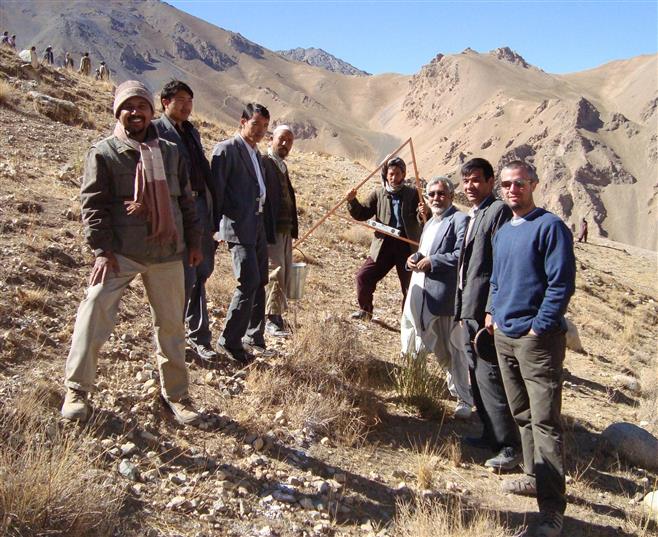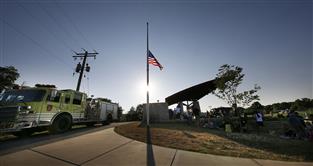Wauwatosa native reflects on time in Afghanistan, Sudan
Bill Schmitt has done humanitarian work abroad since the early 2000s
After years involved in humanitarian work, a Wauwatosa native has returned home — briefly — after a lengthy tenure in Afghanistan.
Bill Schmitt, 36, has spent years working as the country representative for Catholic Relief Services in Kabul, the capital of Afghanistan. While there, Schmitt oversaw more than 360 staff members in five provinces nationwide and worked to implement watershed management and restoration, agriculture, community-based education and humanitarian relief programs.
"There's certainly some risk inherent to this line of work," said Schmitt, adding CRS does take measures to ensure the safety of its employees.
"You can't completely eliminate it."
A passion for other cultures reaches far back for Schmitt, who was born and raised in Wauwatosa. He attended Marquette University High School and completed his undergraduate degree at Marquette University in 2001 before spending a year teaching in Milwaukee and a year volunteering at a center for poor families in Quito, Ecuador.
Schmitt earned a Masters in International Public Affairs from the La Follette School at the University of Wisconsin-Madison in 2005.
An inclination to help
The desire to travel, spend time abroad and learn about different countries could not be extinguished in Schmitt. Following his completion of grad school, he took a one-year job doing humanitarian work in Nicaragua, and when the position came to a close, he had an offer to spend more than a year working in West Darfur in Sudan.
In Sudan, Schmitt served as the area coordinator and helped manage CRS' emergency humanitarian intervention in the northwest corridor of the country — a job that pushed him outside his comfort zone, he said.
"Before that position, my international travel had been limited to Latin America, Peru, Ecuador and Europe," Schmitt said. "I was eager to travel to other parts of the world. I had never been to an active conflict zone."
The experiences in Sudan opened Schmitt's eyes to the impact of conflict.
"There was a lot of raiding of villages, a lot of internally displaced persons who would flee from villages and end up in camps in the outskirts. People would show up with nothing."
Much of Schmitt's work in Sudan consisted of emergency programming; providing food provisions and temporary shelter and digging wells were all part of a day's work.
In 2008, Schmitt became the new head of office for CRS in Bamiyan, Afghanistan, where he oversaw the implementation of activities in agriculture, agro-enterprise development, women's self-help groups, and watershed and natural resource development.
Following a short-term assignment as the emergency team leader for the 2009-2010 West Sumatra earthquake response, Schmitt served as the regional technical adviser for emergencies in Latin America and the Caribbean from 2010-2012, before returning to Afghanistan.
Afghanistan's challenges
Working in Afghanistan, a country plagued with conflict, posed its own unique challenges. A primary challenge was providing education to the nation's youth. The country's government has a very limited presence — especially in communities located further than three kilometers from main district centers — and education is not provided.
"There's no question that Afghanistan has seen conflict, four decades of conflict. It's a place that has huge problems and has had a really difficult time," Schmitt said. "The thing that has always struck me the most is something that doesn't come across in the news."
Schmitt said, overwhelmingly, the people of Afghanistan are the "most generous, kindhearted, warm-welcoming people" he's ever met.
"It's not unlike a lot of situations where the people themselves are not involved in the conflict," he said. "They're looking for the same things as you and me. We want to have peace, want to be able to work and support a family. All of these things that we take for granted."
Despite working long weeks away from family back home, a passion for being exposed to new cultures, new people and new places are likely to keep Schmitt working abroad for years to come.
"As much as there is a lot of diversity in the world, it always strikes me how much we have in common. That's always comforting to see."
Schmitt will spend the summer back home in Wisconsin, doing some traveling here and there, before embarking on a new position with CRS in Turkey, assisting with ongoing humanitarian needs.

E-mail Newsletter
Your link to the biggest stories in the suburbs delivered Thursday mornings.
Enter your e-mail address above and click "Sign Up Now!" to begin receiving your e-mail newsletter
Get the Newsletter!
More from News and Features
- Anodyne Coffee plans to open location in Wauwatosa Village
- Wauwatosa Meetings: Aug. 4
- Video: Wauwatosa girl's curbside ice cream stand raises money for the hungry
- Wauwatosa News and Notes: Hands-only CPR training offered; Firefly Art Fair is Aug. 6-7
- Wauwatosa Ask Now: Why are there barriers and fencing along the North Avenue bridges over the Menomonee River?
- Mystery Photo Contest: July 28
- Wauwatosa gears up for National Night Out event, this year at the zoo
- Election 2016: Wisconsin's 4th District candidates weigh in
- Wauwatosa's Luther Manor residents share smiles through flower delivery
- Wauwatosa Police Report: July 17-23















We welcome reader discussion but strive to keep things civil. Please see our discussion guidelines and terms of use for more information. If you see a comment that violates our guidelines, please flag it for review. If you have any other issues with our commenting system, please let us know.